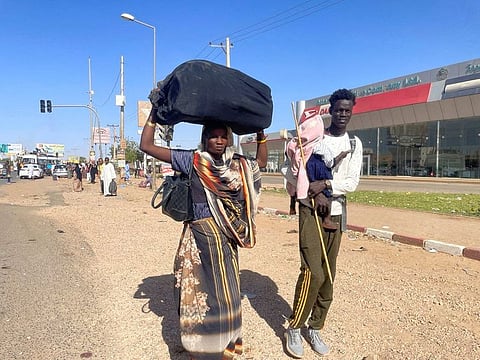Sudanese military rules out negotiations with rival force
Foreign governments look for ways to extract their citizens trapped in conflict

KHARTOUM: Sudan’s military has ruled out any negotiations with the rival paramilitary forces to end the crisis roiling the country and says it will only accept their surrender.
A statement from the military on Thursday said that engaging in talks with the paramilitary Rapid Support Force would only be possible to discuss their surrender.
“There would be no armed forces outside the military military system,” it said.
The statement came as the latest attempt at a 24-hour cease-fire between Sudan’s warring forces grew increasingly strained. The two sides have been battling since Saturday for control of the strategic African country.
Fighters from rival factions, meanwhile, battled around the main military installation in central Khartoum and other parts of the country’s capital, threatening to unravel the latest attempt at a ceasefire as foreign governments looked for ways to extract their citizens trapped in the conflict.
With some parts of the Sudanese capital relatively calmer than previous days, the exodus of residents in Khartoum from their homes appeared to accelerate. “Massive numbers” of people, mostly women and children, were leaving in search of safer areas, said Atiya Abdulla Atiya, secretary of the Doctors’ Syndicate.
The 24-hour ceasefire, which came into effect Wednesday evening, is the most significant attempt yet to halt violence between the military and the paramilitary Rapid Support Forces. The rivals’ fight for control of Sudan has turned the densely populated Khartoum, its neighboring city of Omdurman and other parts of the country into war zones, with millions of Sudanese caught in between.
Rising death toll
At least 330 people have been killed and 3,300 wounded in the fighting since it began Saturday, the UN’s World Health Organisation said, but the toll is likely higher because many bodies lie uncollected in the streets.
A previous truce attempt on Tuesday collapsed as soon as it began, and the two antagonists in the fight — army chief Gen. Abdul Fattah Burhan and RSF commander Gen. Mohammad Hamdan Dagalo — have seemed determined to crush each other in their struggle for power.
Diplomatic efforts were underway to try to shore up and extend the ceasefire.
The truce has not been firm enough to deliver supplies and relief to Sudan’s overwhelmed hospitals , Atiya said. Hospitals in Khartoum are running dangerously low on medical supplies, often operating without power and clean water. Around 70 per cent of hospitals near the clash sites throughout the country are out of service, the Sudanese Doctors Syndicate said Thursday. At least nine hospitals were bombed, it said.
Foreign governments as well geared up to evacuate their citizens from Sudan. But with airports in Khartoum and other cities turned into battlegrounds, it remained uncertain how they would do so.
Japan’s Defense Minister Yasukazu Hamada on Thursday ordered military aircraft sent to the Horn of Africa nation of Djibouti to stand by for an evacuation of around 60 Japanese nationals, though it was not clear when one would take place. The Netherlands sent military transport craft to the Jordanian port city of Aqaba late Wednesday to be ready as well, though the Dutch Defense Ministry acknowledged that “evacuations are not possible at the moment.”



